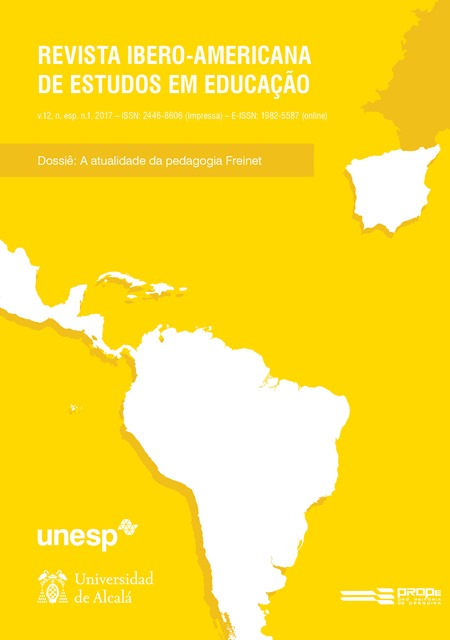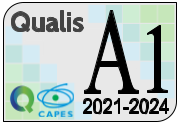Freinet Pedagogy: Enduring Impact Over an Individual Career
DOI:
https://doi.org/10.21723/riaee.v12.n.esp.1.2017.9665Palavras-chave:
Freinet. Pedagogy. Education.Resumo
This article presents an individual perspective on the impact of Freinet Pedagogy across the career of one English language teacher and teacher educator. With special attention to language instruction, I will highlight a number perennially important Freinet dimensions that gradually came to my attention over the years. My admiration for Freinet Pedagogy first arose in relation to two very hands-on techniques: free writing and classroom printing. Later, my interest took a more theoretical turn, through recognition of illuminating consistencies between Freinet Pedagogy and two other more recent developments: broadly, van Lier’s (2004) influential ecological perspective on language learning may be taken as a backdrop against which to highlight the coherence of Freinet Pedagogy both with the flexibly system-based style of planning now advocated by such authorities as Reason (2008), and with the present-day connectionist psychological approach to opportunities for language teaching and learning that has been metaphorically represented in back-to-the-well terms (Sivell & Sivell, 2012).Downloads
Referências
CUMMINS, J.; SAYERS, J. Brave new schools: Challenging cultural illiteracy through global learning networks. Toronto, CA: OISE Press, 1995.
FREINET, C. Education through work (revised ed.). J. Sivell (Trans., 1993). Lewiston, NY: Edwin Mellen Press, 1960a.
FREINET, C. Le texte libre. Cannes, FR: Éditions de l’École Moderne, 1960b.
FREINET, C. Le journal scolaire. (posthumous ed.). Cannes, FR: Éditions de l’École Moderne, 1967a.
FREINET, C. The wisdom of Matthew (posthumous ed.). J. Sivell (Trans., 1990). Lewiston, NY: Edwin Mellen Press, 1967b.
FREINET, C. Pour l’école du people. E. Freinet (Intro. to posthumous edition). Paris, FR: Librairie François Maspero, 1969.
FREINET, C. Les techniques Freinet de l’école moderne (posthumous 10th ed.). Paris, FR: Armand Colin, 1982.
GRABE, W. Reading in a second language. New York, NY: Cambridge University Press, 2009.
HELFTER, C. Que reste-t-il des grands ancêtres...? Monde de l'éducation, v. 242, n. 11, p. 29-48, 1996.
HOLLICH, G.; HIRSCH-PASEK, K.; TUCKER, M.; GOLINKOFF, R. (2000). A change is afoot: Emergentist thinking in language acquisition. Pre-publication draft from P. Andersen, C. Emmeche, N. Finnemann, & P. Christiansen (Eds.). Downward causation, 2000. p. 143-178. Retrieved from http://hincapie.psych.purdue.edu/HHPTuckerG00-DC.pdf
McLAREN, P. Paolo Freire’s legacy of hope and struggle. Theory, culture & society, v. 14, n. 4, p. 147-153, 1997.
MONOT, M. Le temps dont ils ont besoin pour apprendre. Bulletin de la PMEV, may/2008. Retrieved from http://www.pmev.fr/articles.php?lng=fr&pg=3238
MORRISSEY, K.; SIVELL, J. A year of slow: One teacher’s implementation of ‘Back to the well’. Contact, v. 41, n. 1, p. 12-20, 2015.
REASON, J. Human error. Cambridge, UK: Cambridge University Press, 1990.
REASON, J. The human contribution. Burlington, VT: Ashgate, 2008.
RÉGNIER, J-C.; GOUPIL, G. Pedagogia da autonomia: Un livre de Paulo Freire. Le nouvel éducateur, v. 181, p. 25-26, 2006.
SIVELL, C.; SIVELL, J. Sending them back to the well. Contact, v. 38, n. 3, p. 9-18, 2012.
SIVELL, J. Interschool correspondence: A rationale and an invitation. TECFORS, v. 10, n. 3-4, p. 14-15, 1987.
SIVELL, J.; KIRKLAND, B. Student Newspapers for ESL─Theory and Practice, In A. Cumming, A. Gagné; J. Dawson (Eds.). Awarenesses. Toronto: TESL Ontario, 1988. p. 150-154.
SIVELL, J. (1990). Pedagogical exploitation of macro-commands in PC-Write. In: CRAVEN, M-L.; SINYOR, R.; PARAMSKAS, D. (eds.). CALL: Papers and reports. La Jolla, CA: Athelstan, 1990. p 153-165.
SIVELL, J. The Freinet school in action. In: SIVELL, J. (Ed.), Freinet pedagogy: Theory and practice. Lewiston, NY: Edwin Mellen Press, 1994. p. 129-144.
SIVELL, J. Freinet Pedagogy in the Twenty-First Century. In: SAHHUSEYINOGLU, D.; ILISKO, D. (eds.), How do children learn best?. Children’s Research Centre, Ankara Turkey, 2010. p. 12-20
SKINNER, B. F. The technology of teaching. Englewood Cliffs, NJ: Preentice-Hall, 1968.
VAN LIER, L. The ecology and semiotics of language learning: A sociocultural perspective. Boston, MA: Kluwer Academic, 2004.
Downloads
Publicado
Como Citar
Edição
Seção
Licença
Manuscritos aceitos e publicados são de propriedade dos autores com gestão da Ibero-American Journal of Studies in Education. É proibida a submissão total ou parcial do manuscrito a qualquer outro periódico. A responsabilidade pelo conteúdo dos artigos é exclusiva dos autores. A tradução para outro idioma é proibida sem a permissão por escrito do Editor ouvido pelo Comitê Editorial Científico.








